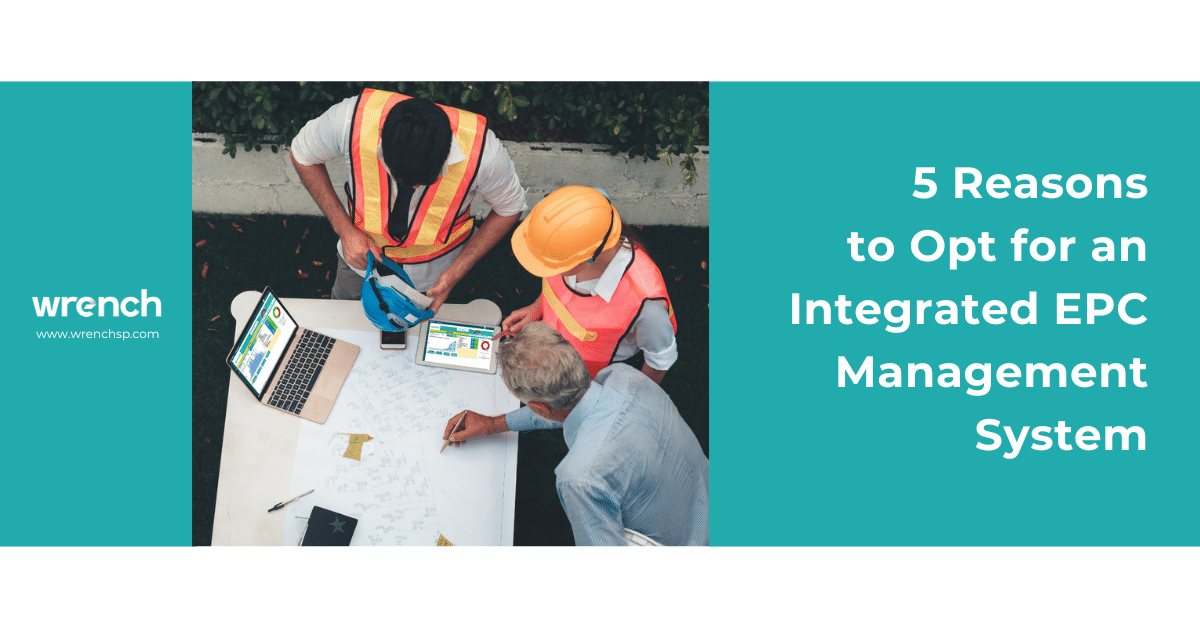- Blog Digital PMO EDMS EPC project management system EPC projects
- 22 Apr 2024
5 Reasons to Opt for an Integrated EPC Management System

With the recent rise of software solutions addressing the engineering procurement construction process, organisations involved in large-scale infrastructure projects are under pressure to replace age-old traditional and/or manual methods with newer digital-driven methods. The challenge is in finding the best fit for their needs. The mind-numbing array of products on offer – from EDMS to DPMO and everything in between – add even more complexity to the already stressful task of finding a software robust enough to be effective in the real world yet flexible enough to cater to the organization’s unique procedures and culture. Add this to the fact that such solutions usually don’t run cheap and come with differences in language, support quality, and learning curves, and the decision to invest in a solution for the complete engineering procurement and construction process gets all too easily pushed to the back burner.
But first, what is an integrated EPC management system? Simply put it’s a software that manages data and documents across the EPC cycle in an integrated manner rather than in separate silos as is the case in most companies today. With an integrated engineering procurement construction system the data generated from one process is fed to another, and the documents across the design to delivery project lifecycle work in cohesion from project start to project finish.
This has several advantages over non-integrated solutions, like:
- Effective Portfolio Management: Companies can handle their project portfolios much more efficiently as their EPC management system can easily manage any number of projects in parallel. An integrated system by definition will help planners deploy personnel and other resources optimally across the engineering, procurement, and construction cycle (without impacting quality or budgets negatively) and this makes the business bottom line more profitable right from the start. An integrated EPC management system enables human project managers to juggle more responsibilities without getting overwhelmed, and so the company is able to use the same resource more productively.
- Improved budgeting and accounting: In some of the more advanced systems, data related to budgeting and accounting is auto-updated as work progresses. Since the system is integrated this means managers can track costs in relation to project phases. For example, let’s say an item has to be procured in the three months after the project start. With an integrated EPC MS the procurement plan is already in the system, it will generate a purchase order to the suppliers in time and help the concerned manager track its delivery in real time. This way there will be no catastrophic surprises.
- System-driven document management: An integrated system will be able to track all project documents, like RFQ’s, RFP’s, diagrams, layouts, Bill of materials, POs, invoices, memos, contract documents, etc., as well as all project-related communication and correspondence. Thus, it can help managers track progress at the macro as well as micro levels and at every step of every stage all the documentation (or evidence) will be always ready to hand and always up to date as the system has been keeping track in the background. An integrated system is by default a cloud-based system, so there will be a single archive of all documents, meaning that files can be found in real time from any location in a matter of minutes.
- Assured Quality and Handover Documentation: An integrated EPC management system updates documents automatically, meaning all documents are always verified and accurate. So instead of spending a lot of time tracking down handover documentation at the end of the project – or worse still, scrambling to create it after the fact – project managers can be confident that all the documents to be handed over to the client is ready and waiting because the requirements would have been built in to the system at the start of the project. For the same reason, ensuring quality is effortless with an integrated system as compliance requirements and protocols are built in to the workflows, making sure that no steps are skipped or forgotten throughout the cycle in every phase. This ensures that quality across the engineering, procurement, and construction process is achieved with almost no human effort at all.
- Business advantage to win more projects: A typical EPC contract is like any other professional services contract with each phase ie engineering, procurement, and construction, being managed by a different entity or group. With an integrated system, all the stakeholders, whether internal or a mix of internal and external can work one a single shared platform. This ensures smooth collaboration in technical matters with a system managing the many revisions involved at the engineering stage.
In conclusion, although integrated software solutions for full-cycle EPC project management are relatively new, the time is not far when they will become the norm rather than the exception. Companies seeking to make the most out of their software investments have to start thinking beyond traditional document and information management systems if they want to get the most from those investments.
Shabna has over 7+ years of experience in the construction project management sector, having worked with leading consultancies like AECOM, Colliers, and CBRE. She is a Civil Engineer with a Master’s degree in Building Engineering and Management from SPA, New Delhi, and has a deep understanding of project management processes with a focus on project controls and presentation.
Related Posts

EDMS Features and Functions
When an EPC organisation, be it an owner, architect, contractor, or consultant, starts on a journey of digital transformation the first step is likely an EDMS or engineering document management system. The expectation is that…
- 10 Apr 2025

Engineering DMS vs Electronic DMS
The term EDMS has become commonplace in engineering-related sectors these days, especially in EPC project verticals where the management of technical documentation is a key factor in successful project delivery. It must be noted that…
- 04 Apr 2025
Archives
- April 2025
- March 2025
- February 2025
- January 2025
- November 2024
- October 2024
- September 2024
- August 2024
- July 2024
- June 2024
- May 2024
- April 2024
- March 2024
- January 2024
- December 2023
- November 2023
- September 2023
- August 2023
- July 2023
- June 2023
- May 2023
- April 2023
- March 2023
- February 2023
- January 2023
- December 2022
- November 2022
- September 2022
- June 2022
- May 2022
- April 2022
- March 2022
- January 2022
- November 2021
- October 2021
- July 2021
- June 2021
- May 2021
- March 2021
- February 2021
- January 2021
- December 2020
- November 2020
- September 2020
- August 2020
- June 2020
- April 2020
- March 2020
- February 2020
- January 2020
- November 2019
- October 2019
- September 2019
- August 2019
- April 2019
- March 2019
- December 2018
- October 2018
- September 2018
- August 2018
- July 2018
- June 2018
- May 2018
- April 2018
- January 2018
- November 2017
- October 2017
- September 2017
- May 2017
- April 2017
- March 2017
- February 2017
- January 2017
